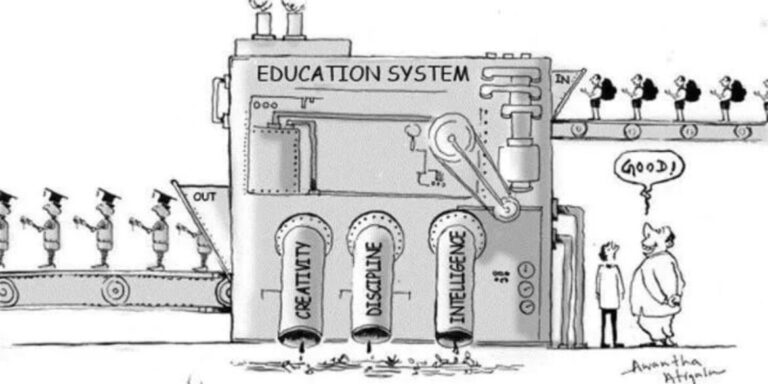By Anjali Mehta
AI programmes are crafted to curate social media content in a manner that captivates the user’s attention for long hours. Social media posts that gain the most traction through a binary like-or-dislike scheme are promoted, while meaningful journalism and art fall by the wayside.
A frequent discussion today is the future of Artificial Intelligence (AI). Humans, while enjoying AI’s technological advantages, fear its many downsides: such as its contribution to increased unemployment, deep fake scams, and possible rogue takeovers of human digital communication. To my mind, the opposite, that is humans mimicking robots or computer programmes in their thinking and demeanour, is of greater concern.
AI programmes are crafted to curate social media content in a manner that captivates the user’s attention for long hours. Social media posts that gain the most traction through a binary like-or-dislike scheme are promoted, while meaningful journalism and art fall by the wayside. Forcing such polarised responses makes for easy computation of data, but snatches away the deeper satisfaction of an enriching conversation based on well thought-out, comprehensive answers.
Computers are based on the stark binary system of the numerals 0 and 1, combinations of which are used to execute various programmes. Humans, on the other hand, are delightfully nuanced with hues of grey. No two humans are created exactly alike.
Yet, humans nowadays are more enthralled by repetitive digital content on their screens than even another unique human being sitting beside them. In today’s capitalistic milieu, even as each business is encouraged to create its ‘USP’ (Unique Selling Point) to garner funds from investors, ironically, humans are increasingly pressurised to conform to the wider collective. Where hardline governments and rigid social structures exist, they try to get citizens to act as a herd of docile and regimented beings. Critical thinking and asking questions are not encouraged.
The greatest human qualities like outspokenness, courage and curiosity are seen as irritants by those in power, as they seek to dominate others. All this leads to more and more robotic conformation. Rather than adding richness and diversity with our unique perspectives, we become simple ones and zeros, at variance with the natural world around us. Humans have integrated tightly with their biological environments for centuries. Circadian rhythms, maternal instincts and the hyperactive senses of certain animals are just some of the natural concepts that AI is not currently capable of understanding or mimicking.
The American psychoanalyst Dr Clarissa Pinkola Estes powerfully highlighted how important it was to be ‘natural.’ In her celebrated book ‘women who run with the wolves,’ she reasoned that many mental stresses and illnesses experienced by women were brought on by them being constantly conditioned to behave in a particular way, for example, to sit in a ladylike manner, not laugh too loudly, and so on. She felt that the undue suppression of natural instincts, for example, a desire to laugh throatily at a funny incident ~ was not healthy. Speaking of naturalness, we know that the real world, unlike the streamlined world of computer programs, is highly chaotic.
While scientific models of physics do give us sets of predictable rules and laws, nature is equally full of unpredictability. Professor Edward Lorenz worked out that even a small change in the starting point of a mathematical weather model could have an enormous impact on the outcome. Since change is constant in the universe, an exact starting point of a model cannot truly be determined. His talk titled Predictability: Does the Flap of a Butterfly’s Wings in Brazil Set Off a Tornado in Texas?” led to the familiar term ‘butterfly effect’ i.e., small actions having powerful impacts.
The natural world is defined by transience and the ephemeral nature of things. AI follows specific scripts that will never change unless they are continuously reprogrammed. So, it can never truly mimic the ebb and flow of life. If humans lose their spontaneity and naturalness, they begin to resemble AI more! Likewise, in our workplace, what sets humans apart from computer programs is the passion we bring to a job and the discretion we use.
A security guard who stops a frail elderly gentleman, whom he fully recognizes and who poses no security risk, from entering a building just because the gentleman forgot his building pass, is behaving mechanically. It is the discretion and kindness we bring to the job that truly separates us from programmed tasks that even AI can do. Another attractive quality in humans is originality. This is valued in all spheres, from music to films to writing. So much so that plagiarism checks are an integral part of any editing.
Yet now there is a tendency to allow ChatGPT to formulate a standardised language for your message and when you type an email, readymade, mundane, cliched phrases land up magically at your fingertips so that you do not have to make the effort to think. These phrases serve the purpose. But they do not have the beautiful flair like us for using diverse, rich, adjectives or the nuanced writing that we would ourselves create. To retain our human faculties, we need to resist this automation.
The qualities of love and reverence that humans exhibit through their mannerisms and art cannot be replaced by an algorithm. Love drives so much positive action in the world that philosophers and poets alike equate it with the very Almighty. Its broad spectrum can include different facets; the fierce maternal instinct to protect a young one or the ability of a soldier to sacrifice their life to guard something of value or the romantic love that transcends all social barriers.
AI just cannot modify its pre-programmed instructions out of an act of love unlike humans who base many of their life choices on the stirrings of their hearts. Whom to marry, where to live, a woman sacrificing her career prospects to be with someone she loves, parents sacrificing their own needs so that their kids can lead a better life and so on. Similarly, the value of art lies in the meaning that a spectator draws from it and how they connect to it. Banksy’s art is considered beautiful and special because of his life story and social messages.
He paints stealthily in public areas across the world and his powerfully themed art is discovered without his identity being known till date. AI can replicate his drawings but not his mystique. While better using AI to address efficiency and time concerns, we should also focus on improving our own abilities. If we do not allow our minds and thoughts to widen and evolve, we do run the risk of being overtaken by a mere programme.
AI programmes are constantly evolving and increasingly getting better and more sophisticated. Many humans, on the other hand, are allowing their finer thinking to regress, and basic instincts to take over. This is evident from the rapidly increasing divisions we see in society based on caste, creed, and religion. Rather than building up the human spirit to transcend boundaries we are mostly at war with one another. Even as AI gets better, humans allow their own enviable potential to deteriorate.
To conclude, what protects humans best from AI is merely being human. Being warm, engaged, reverent, loving and keeping one’s naturalness and sense of humour intact. On the other hand, when we do things mechanically, or treat other humans merely as numbers or constrict our imaginations, we bring ourselves closer and closer to AI
(The writer is Delhi-based medical practitioner. It was published in The Statesman)




